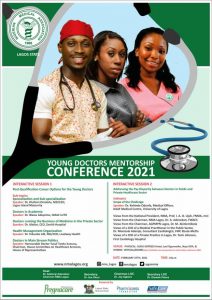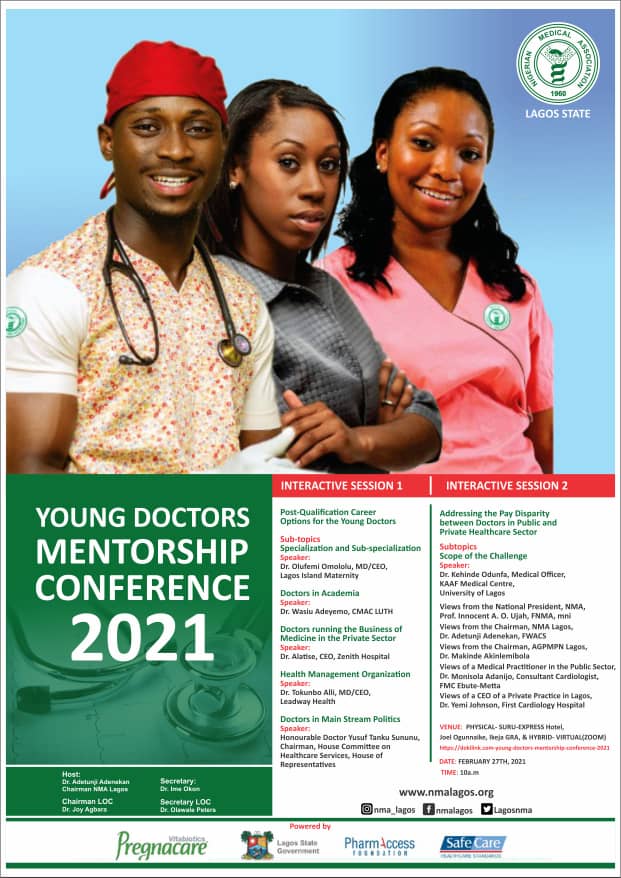During the YOUNG DOCTORS MENTORSHIP CONFERENCE organized by NMA Lagos, as a Hybrid event on Saturday, 27 February 2021, different practitioners from different sectors came together to address issues affecting young doctors in Nigeria. One of these issues was the “Pay Disparity between Doctors in the Public and Private Healthcare Sector’. This pertinent topic was addressed by renowned panelists from recognized institution in the Public and Private health sector, including both the young and elderly doctors.
According to Dr. J. J. Emene of AGPMPN, “pay disparities” has been in existence since time immemorial, as far back as the 1980s, a consultant was complaining about his pay openly on a ward round in a public tertiary hospital. The public sector as of today generally pays more than the private sector, this can be arguably accredited to the more work load in public hospitals and salaries being centralized and paid by the government whether the hospital is generating enough income or not. However, even in the public sector, different parastatals with massive income generation (e.g. NNPC) have their own pay structure which is higher than the general civil service.
A young doctor in the private practice, Dr Kehinde Odunfa, sharing his experience over the past 4 years across different locations, emphasized on the low paying disparity among private hospitals. As a Medical Officer in Abuja, he was on a FCT locum group for MOs with locum job offers going for as low as 400 Naira per hour, and this still involved traveling long distance. He pointed out that the poor remuneration for doctors in private hospitals do not only affect the doctors but everyone attached to them.
Furthermore, the Chairman of NMA Lagos (Dr Adetunji Adenekan), delved into certain skewed views affecting the private sector, such as NMA welfarism and certain packages (CONMESS, COVID allowance) which are supposed to be for all Doctors ideally, but were only made available for the public sector. He also highlighted that private facilities pay higher in some cases but largely, public hospitals pay the young doctors more, when compared.

Also, during the discussion one of the questions raised by the young doctor was about the delayed pay of House Officers, which was answered by Prof. Innocent Ujah (National, NMA president), he enlightened the audience that “NMA doesn’t pay salary but the payment for HO is on with MDCN”. He also stated the 86,000 Naira payment news circulating on social media isn’t true and what was delaying the payment according to the MDCN registrar is the reconciliation of their own HOs list and the one submitted by the CMDs, which appears to be different. This is because appropriate documentation and due process is important and must be adhered to in payment of salaries at the civil service but unfortunately taking sometime. He, therefore encouraged the young doctors to be patient, polite and seek the right information before reacting.

Other recommendations by discussants during the panels include;
Having a standardized paying structure for wages and salaries of doctors (an equivalent of the CONMESS available for the public sector), with a system to report and reprimand violating private facilities across Lagos and Nigeria.
Revisiting, refurbishing and enforcing the existent document created in 2003 from the AK OYEKAN Panel – a template of minimum pay for workers and services charge in private practice regardless of location. This will eliminate the wide range of bias, discrepancies and set a unified baseline for minimum amount paid for services rendered and earned by Medical Officers in private facilities.
Public – private partnership for organizing continuous trainings and skills for medical officers in private practice –which should be recognized by MDCN and other government parastatals – would go a long way in adding more value to the private sector worker. For example, a private facility in Lagos conduct exams every 6 months for their MOs, to access their knowledge and skills, which translates into getting a salary raise and other benefits, depending on their performances. This reinforces positive motivation for personal and organization growth in the private sector.
Finally, budgeting for health in the private sector should be improved on. Acknowledging that the WHO and national budget are usually 100% for public health sector and never including the private health sector.




